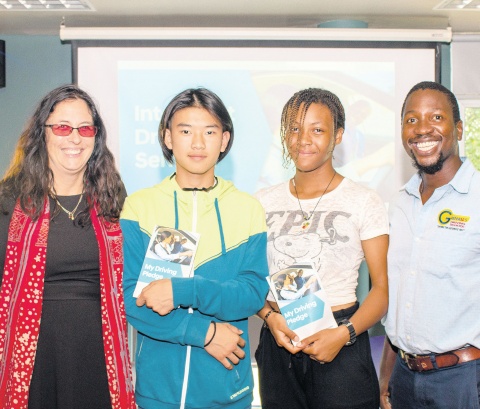
From left: Melanie Kells, principal of AISK; grade-eight students Yanhua Liang and Nikole Okonmah; and Seth Grennell, senior driving instructor, Grennell’s Driving School.
Hyundai creates safe driving education programme for teens
“What are you wearing tonight? I’m wearing that outfit I bought last week.” Glancing at this message on your smartphone seems simple, but engaging in this form of distracted driving can cause a life-threatening accident.
Now more than ever, we are compelled to stay connected so we can always be in the know. We find ourselves using our phones while doing several tasks, including driving. Doing the latter falls within the category of distracted driving, which refers to an attempt to engage in any activity while operating a motor vehicle. However, texting and driving is considered very dangerous as the average text sent or read by a driver takes his or her eyes off the road for five seconds. This replaces drunk drivers as the ultimate threat on the road.
“Distracted driving has been one of the major causes of accidents and road fatalities. This is because many people believe that they can multitask while driving. They do not realise that numerous things can happen on the road in a split second. For the benefit of all road users, it is important that drivers pay attention to the road and not their phone,” said Senior Superintendent of Police Calvin Allen, head of the Traffic and Highway Patrol Division of the Jamaica Constabulary Force.
Magna Motors Limited, the official distributor of Hyundai motor vehicles in Jamaica, is championing safe driving practices in schools. As part of their #myroadsafetyhero campaign, Hyundai recently launched an Intelligent Driving programme aligned with the National Road Safety Council (NRSC) and Grennell’s Driving School. The initiative aims to increase awareness of safe driving habits among teens so they can become safety champions on the road.
FOSTERING GOOD ROAD-SAFETY HABITS
Andrew Lee, Magna Motors sales and marketing executive, noted, “At Hyundai, safety is our number-one priority for all road users. Teens are the next generation of drivers, so we want to equip them with knowledge-based tools focused on good road safety habits they can employ when using the nation’s roads. April is Distracted Driving Awareness Month, so there is no better time to shed light on this issue among young drivers.”
The first seminar was held at the American International School of Kingston (AISK) and engaged teachers and students on how to become better drivers. The conversation covered all aspects of driving, from eligibility to teen driver education tips and techniques, as well as a special emphasis on distracted driving.
“The students really need this information because driving is such an important safety issue, and we want them to be safe. We have a high student driver population, so I am happy they received this information, and I know they will share it with their friends. This will definitely help them make all the right decisions when they are behind the wheel,” said Melanie Kells, middle- and high-school principal of AISK.
Among the beneficiaries of the seminar is 14-year-old Nicole Okonmah. Keen to learn about proper road use, Okonmah engaged in the discussion with a receptive mind and positive attitude.
She said, “The discussion was very informative and relevant because it is popular for teenagers to use their phones even while driving. This conversation highlighted the dangers of distracted driving, as well as the importance of practising good road-safety habits. Because of this session, I am now able to identify good and bad driving techniques, and I will be less likely to use my phone while driving when I become a driver.”
More schools in the Corporate Area will benefit from this seminar in upcoming weeks. In addition to good road-safety habits and the dangers of distracted driving, teens will also learn about the new road traffic act that will be implemented this year.
Magna Motors has developed a parent-teen driver pledge that, among other things, encourages teen drivers to:
• Put their cell phone on silent so they will be discouraged from talking and texting while driving.
• Always wear their seat belts.
• Keep both hands on the wheel.
• Drive only when they are fully alert.
• Call their parents for a ride home if they are physically or mentally impaired.

